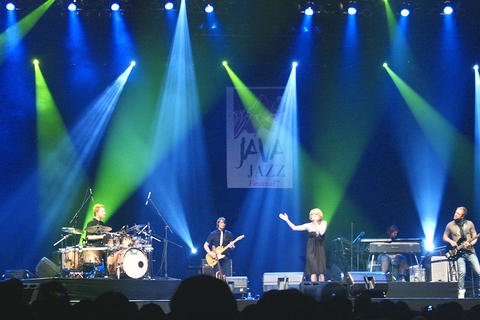Java conjures up steaming cups of strong coffee in the minds of many. After last week's Java Jazz Festival, it should be jazz.
The festival is the largest gathering of jazz musicians in the world, with over 1,000 performers. This year it included artists of almost every jazz sub-genre. Jazz virtuosos like Lee Ritenour, standard jazz vocalists like Kurt Elling, R 'n' B/Soul legends like Incognito, smooth jazz artists like Marc Antoine and even pop stars like Babyface, all made appearances..
When we - the bandmates and friends I was traveling with - arrived at the Jakarta Convention Center, there was already a huge crowd and a plethora of souvenir vendors. It looked like a rock concert rather than a jazz festival. At the door, we saw the members of a young jazz band playing with skill beyond their years - and that was just the outdoor stage.

PHOTO: COURTESY OF RICHARD LI
After entering the venue there was a problem: With 20 stages, how would we ever decide which act to watch? Luckily, we found out that legendary keyboardist Jeff Lorber was playing the opening act in the Exhibition Hall and ran to hear it like paparazzi after celebrities.
Over the three-day festival, for which we had purchased passes for US$100, we often had the same problem. We did get to see some great performances, though. Joe Sample and Steve Gadd were there. Incognito reunited with Maysa in a groovy act that had the audience up and dancing. Ex-Yellowjackets drummer William Kennedy backed up Lee Ritenour. Old comrades Melvin Davis and Patrice Rushen released a fusion of Latin and West Coast jazz. Besides these renowned international artists, there were also many Indonesian bands, most of which appeared to be quite young.
Taiwan's presence was felt when Taiwanese band SiZhuKong (絲竹空) performed. The band's combination of traditional Chinese ballads and modern jazz gave a fresh twist to traditional songs.
In between shows, we did some people watching. Not knowing the popularity of jazz music in Indonesia, we had thought most of the audience would be expats. In reality, the majority of participants appeared to be young, local people. We could see their enthusiasm for jazz, as many sang along with the performers. We were surprised by this passion for and acceptance of jazz music, which often takes second stage to pop idols in the hearts of the young.
The sound systems used throughout the event ensured that the music came out crystal clear. All of the audio-visual and broadcasting equipment, as well as the hardware and software, was operated by professional crews. The overall experience was like watching meticulously edited DVDs of live gigs with a 5.1 Dolby stereo. The professional staff of 1,000 ensured that everything ran smoothly.
In a cost-benefit analysis after the event, I found that this large-scale event barely turned any profit at all, but for those who went, the benefits were off the books.

This is the year that the demographic crisis will begin to impact people’s lives. This will create pressures on treatment and hiring of foreigners. Regardless of whatever technological breakthroughs happen, the real value will come from digesting and productively applying existing technologies in new and creative ways. INTRODUCING BASIC SERVICES BREAKDOWNS At some point soon, we will begin to witness a breakdown in basic services. Initially, it will be limited and sporadic, but the frequency and newsworthiness of the incidents will only continue to accelerate dramatically in the coming years. Here in central Taiwan, many basic services are severely understaffed, and

Jan. 5 to Jan. 11 Of the more than 3,000km of sugar railway that once criss-crossed central and southern Taiwan, just 16.1km remain in operation today. By the time Dafydd Fell began photographing the network in earnest in 1994, it was already well past its heyday. The system had been significantly cut back, leaving behind abandoned stations, rusting rolling stock and crumbling facilities. This reduction continued during the five years of his documentation, adding urgency to his task. As passenger services had already ceased by then, Fell had to wait for the sugarcane harvest season each year, which typically ran from

It is a soulful folk song, filled with feeling and history: A love-stricken young man tells God about his hopes and dreams of happiness. Generations of Uighurs, the Turkic ethnic minority in China’s Xinjiang region, have played it at parties and weddings. But today, if they download it, play it or share it online, they risk ending up in prison. Besh pede, a popular Uighur folk ballad, is among dozens of Uighur-language songs that have been deemed “problematic” by Xinjiang authorities, according to a recording of a meeting held by police and other local officials in the historic city of Kashgar in

It’s a good thing that 2025 is over. Yes, I fully expect we will look back on the year with nostalgia, once we have experienced this year and 2027. Traditionally at New Years much discourse is devoted to discussing what happened the previous year. Let’s have a look at what didn’t happen. Many bad things did not happen. The People’s Republic of China (PRC) did not attack Taiwan. We didn’t have a massive, destructive earthquake or drought. We didn’t have a major human pandemic. No widespread unemployment or other destructive social events. Nothing serious was done about Taiwan’s swelling birth rate catastrophe.